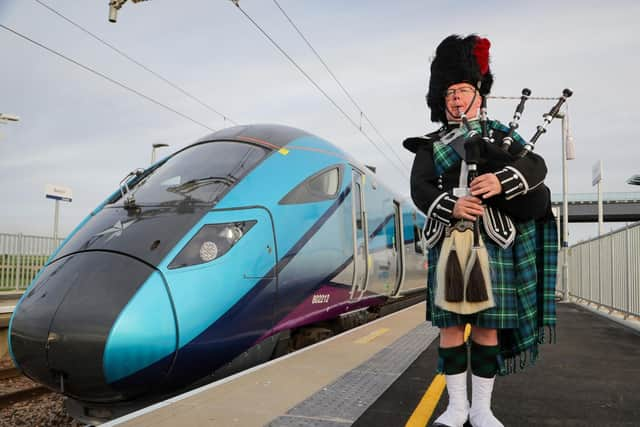ScotRail cuts show that a 'Scottish' label doesn't make services better – Murdo Fraser MSP
Whisper it, because the current orthodoxy is that simply adding the word “Scotland” to something makes it better. But what we experience too frequently is proof that this is false. And that is something Scots should start to shout about.
I have long believed that decisions about Scotland are usually better made in Scotland because that brings power closer to the people affected by them. That is why I am a supporter of devolution. But that is just the start. You still have to get the decisions right, and no kilt can dress up a mistake to make it work.
Advertisement
Hide AdAdvertisement
Hide AdWe were told that taking ScotRail – not appreciably a better operator than any other by addition of the word "Scot” – services into Scottish public hands would be better for the Scottish public. Just six weeks in, it has been a disaster. A third of ScotRail services have been cut for the foreseeable future with no promise of their return.
If this had been a decision taken in London, or Brussels, there would be public demonstrations in anger and disgust. But because the decision was made in Edinburgh, with a tartan bow on it, we are supposed to accept it. I think not.
One of the benefits of public ownership was supposed to be public control. Yet the public’s representative, the transport minister, Jenny Gilruth, says she is powerless to intervene. That is worth spelling out.
The Scottish Government has taken the railways into their control. The Scottish Government has approved a plan to cut our railway journeys by a third. The Scottish Government say they are powerless to intervene.


It is a strange, uniquely Scottish, development of the principle of subsidiarity which should now presumably read: decisions about Scotland are better made in Scotland by Franz Kafka.
The SNP have long asked us to believe in Scottish exceptionalism. Well, here we have a fiasco that is truly exceptional. The upside the transport minister has emphasised is that passengers wanted more certainty and now they have got it. But the certainty that there is no train is not the comfort they were looking for. The certainty they cannot get to their work, the certainty they cannot get home, is not what any of us sought.
The damage to people’s lives, to the economy and to the fabric of Scottish life, is incalculable. You cannot now get from Oban to Glasgow and back in a day – unless you start your return journey half an hour after you arrived. Or, of course, you have a car.
I have constituents in Fife and Stirling who work shifts for the NHS in Edinburgh. The last train back leaves around 8pm. How do they get home? Are they expected to borrow, or hire, a car, and then pay exorbitant parking charges? There are no answers from this SNP government.
Advertisement
Hide AdAdvertisement
Hide AdChoose your crisis, that is inimical whichever one you opt for. The climate crisis? The First Minister wants to stop development of oil and gas fields, costing tens of thousands of Scottish jobs, to cut greenhouse gases. Then she gives people no option but to get into their cars. The cost-of-living crisis? You may not be able to afford to fill your petrol tank but that may be the only way you can get to work.
Having shut down a third of ScotRail’s services, on Monday the transport minister turned up at the opening of a new station, Reston, in the Borders. As she celebrated this achievement she failed to mention that the decision to build it was taken by the UK authority, Network Rail, whose powers she wants devolved but thankfully she does not have. She also did not mention that no ScotRail services stop there and that it is serviced only by UK train companies.
So, when the Scottish transport minister looked for a good news story about Scottish railways, she didn’t look to the company that is in her hands, she looked to the achievements of companies in UK hands.
Sometimes decisions that are good for Scotland are taken outwith Scotland, although the SNP would never admit it, just as they will never admit so many of the decisions they take here are disastrous for Scotland.
That is why we need to change the terms of political debate in Scotland. The question must change from being “is this Scottish enough?” to “is this good enough for Scotland?” On the latter question, whether you support leaving the UK or remaining, the SNP are patently failing.
Things are not fairer, simply because they are Scottish, just as policies made in England are not inherently unfair, as Nicola Sturgeon and Ms Gilruth would like you to believe.
If things are fairer in Scotland, it is not simply because they have a Scottish label. It is because Scots worked hard to make them that way, to embed them in our way of life and thinking. There is no moral exceptionalism automatic to being a Scot and to pretend otherwise is to lack the gift to see ourselves as others see us.
Under the SNP we are the ship-building nation that the world can see cannot build a ferry. Doubtless Ms Gilruth will regard it as an achievement that there is now certainty that there is no train for the unbuilt ferries to fail to meet.
Advertisement
Hide AdAdvertisement
Hide AdBut when she does so, she proves a vital point about self-government. Decisions about Scotland are often best made in Scotland – but not in unreality.
Murdo Fraser is a Scottish Conservative MSP for Mid-Scotland and Fife
Comments
Want to join the conversation? Please or to comment on this article.
